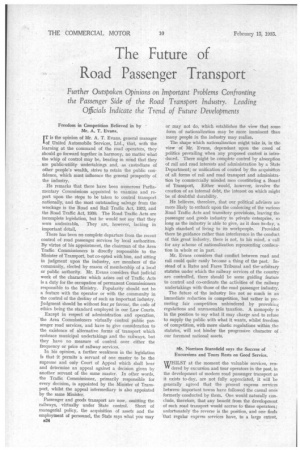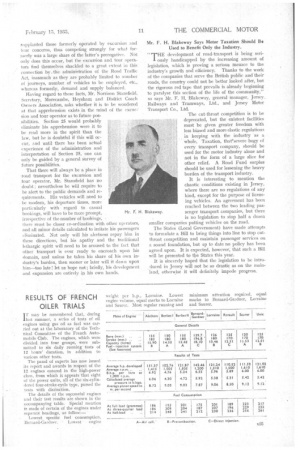The Future of Road Passenger Transport
Page 40

Page 41

If you've noticed an error in this article please click here to report it so we can fix it.
Further Outspoken Opinions on Important Problems Confronting the Passenger Side of the Road Transport Industry. Leading Officials Indicate the Trend of Future Developments
Freedom in Competition Believed in by Mr. A. T. Evans.
IT is the opinion of Mr. A. T. Evans, general manager of United Automobile Services, Ltd., that, with the learning at the command of the road operators, they should go forward together in harmony, no matter what the whip of control may be, bearing in mind that they are public-utility undertakings and, as custodians of other people's wealth, strive to retain the public confidence, which must influence the general prosperity of the industry.
He remarks that there have been numerous Parliamentary Commissions appointed to examine and report upon the steps to be taken to control transport nationally, and the most outstanding salvage from the wreckage is the Road and Rail Traffic Act, 1933, and the Road Traffic Act, 1930. The Road Traffic Acts are incomplete legislation, but he would not say that they were undesirable. They are, however, lacking in important detail.
There has been no complete departure from the recent control of road passenger services by local authorities. By virtue of his appointment, the chairman of the Area Traffic Commissioners is directly responsible to the Minister of Transport, but co-opted with him, and sitting in judgment upon the industry, are members of the community, elected by reason of membership of a local or public authority. Mr. Evans considers that judicial work of the character which arises out of Traffic Acts is a duty for the occupation of permanent Commissioners responsible to the Ministry. Popularity should not he a feature with the operator or with the community in the control of the destiny of such an important industry. Judgment should be without fear pr favour, the code of ethics being the standard employed in our Law Courts.
Except in respect of administration and operation, the Area Commissioners virtually .control public passenger road services, and have to give consideration to the existence of alternative forms of transport which embrace municipal undertakings and the railways, but they have no measure of control over either the frequency or price of railway services.
In his opinion, a further weakness in the legislation is that it permits a servant of one master to be the supreme and only Court of Appeal which shall hear and determine an appeal against a decision given by another servant of the same master. In other words, the Traffic Commissioner, primarily responsible for every decision, is appointed by the Minister of Transport, whilst the appeal intermediary is also appointed by the same Minister.
Passenger and goods transport are now, omitting the railways, virtually under State control. Short of managerial policy, the acquisition of assets and the employment of personnel, the State says what you may B24 or may not do, which establishes the view that some form of nationalization may be more imminent than many people in the industry may realize.
The shape which nationalization might take is, in the view of Mr. Evans, dependant upon the creed of politics prevailing when any proposed control is introduced. There might be complete control byabsorption of rail and road interests and administration by a State Department; or unification of control by the acquisition of all forms of rail and road transport and administration by commercially minded men constituting a Board of Transport. Either would, however, involve the creation of an internal debt, the interest on which might be of doubtful durability.
He believes, therefore, that our political advisers are more likely to embark upon the coalescing of the various Road Traffic Acts and transitory provisions, leaving the passenger and goods industry to private enterprise, so long as the industry is able to give, as it does to-day, a high standard of living to its workpeople. Provided there be guidance rather than interference in the conduct of this great industry, there is not, to his mind, a call for any scheme of nationalization representing confiscation in whole or in part.
Mr. Evans considers that conflict between road and rail could quite easily become a thing of the past. Instead of a Rates and Fares Tribunal and the arbitrary statutes under which the railway services of the country are controlled, there should be some guiding feature to control and co-ordinate the activities of the railway undertakings with those of the road passenger industry.
The future of the industry lies not so much in an immediate reduction in competition, but rather in premoting fair competition unhindered by provoking regulations and unreasonable taxation. A monopoly is in the position to say what it may charge and to refuse to supply the public with what it wants, whilst freedom of competition, with more elastic regulations within the statutes, will not hinder the progressive character of our foremost national assets.
Mr. Norrison Stansfield says the Success of Excursions and Tours Rests on Good Service.
WHILST at the moment -the valuable services, tenVV dered by excursion and tour operators in the past, in the development of modern road passenger transport as it exists to-day, are not fully appreciated, it will be generally agreed that the present express services between important towns have followed the casual ones formerly conducted by them. One would naturally conclude, therefore, that any benefit from the development of such road transport would accrue to these operators; unfortunately the reverse is the position, and one finds 'that regular express services have, to a large extent, supplanted those formerly operated by excursion and tour concerns, thus competing strongly for what formerly was a large share of the latter's prerogative. Not only does this occur, but the excursion and tour operators find themselves shackled to a great extent in this connection by. the administration of the Road Traffic Act, inasmuch as they are probably limited to number of journeys, number of vehicles to be employed, etc., whereas formerly, demand and supply balanced.
Having regard to these facts, Mr. Norrison Stansfiekl. Secretary, Morecambe, Heysham and District Coach Owners Association, asks whether it is to be wondered at that apprehension exists in the mind of the excursion and tour operator as to future pos.sibilities. Section 25 would probably eliminate his apprehension were it to be read more in the spirit than the law, but he is doubtful if this will occur, and until there has been actual experience of the administration and interpretation of Section 25, one can only be guided by a general survey of future possibilities.
That there will always be a place in road transport for the excursion and tour operator, Mr. Stansfield has no doubt ; nevertheless he will require to be alert to the public demands and requirements. His vehicles will need to be modern, his departure times, more particularly with regard to casual bookings, will have to be more prompt, irrespective of the number of bookings. there must be closer co-ordination with other operators, and all minor details calculated to irritate his passengers eliminated. Not only will his alertness repay him in these directions, but his apathy and the traditional lethargic spirit will need to be aroused to the fact that other transport is ever ready to encroach upon his domain, and unless he takes his share of his own industry's burden, then sooner or later will it dawn upon him-too late ! let us hope not ; briefly, his development and expansion arc entirely in his own hands. Mr. F. H. Blakeway Says Motor Taxation Should Be Used to Benefit Only the Industry.
" THE development of road-transport is being seri ously handicapped by the increasing amount of legislation, which is proving a serious menace to the industry's growth and efficiency. Thanks to the work of the companies that serve the British public and their roads, the country could not be better looked after, but the rigorous red tape that prevails is already beginning to paralyse this section of the life of the community," so says Mr. F. H. Blakeway, general manager, jersey Railways and Tramways, Ltd., and Jersey Motor Transport Co., Ltd.
The cut-throat competition is to be deprecated, but the existent facilities must be given greater freedom with less biased and more elastic regulations in keeping with the industry as a whole. Taxation, that'severe bogy of every transport company, should be used for the motor industry alone and not in the form of a large slice for other relief. A Road Fund surplus should be used for lessening the heavy burden of the transport industry.
It is interesting to mention the chaotic conditions existing in Jersey, where there are no regulations of any kind, except for the purpose of licensing vehicles. An agreement has been reached between the two leading passenger transport companies, but there is no legislation to stop half a dozen smaller companies putting vehicles on the road.
The States (Local Government) have made attempts to formulate a Bill to bring things into line to stop cutthroat competition and maintain passenger services on a sound foundation, but up to date no policy has been agreed upon. It is expected, however, that such a Bill will be presented to the States this year.
It is sincerely hoped that the legislation to be intro, duced in Jersey will not be so drastic as on the mainland, otherwise it will definitely impede progress.




























































































